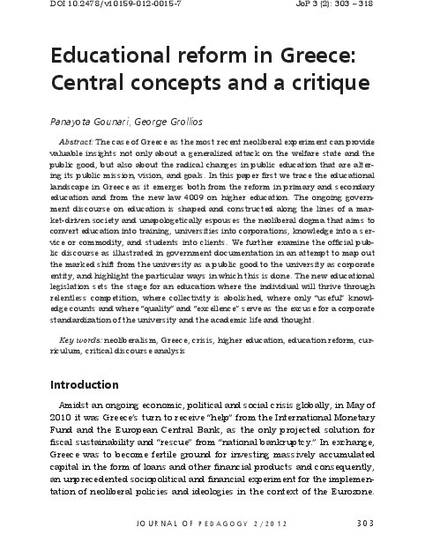
Article
Educational Reform in Greece: Central Concepts and a Critique
Journal of Pedagogy
(2012)
Abstract
The case of Greece as the most recent neoliberal experiment can provide valuable insights not only about a generalized attack on the welfare state and the public good, but also about the radical changes in public education that are altering its public mission, vision, and goals. In this paper first we trace the educational landscape in Greece as it emerges both from the reform in primary and secondary education and from the new law 4009 on higher education. The ongoing government discourse on education is shaped and constructed along the lines of a market-
driven society and unapologetically espouses the neoliberal dogma that aims to convert education into training, universities into corporations, knowledge into a service or commodity, and students into clients. We further examine the official public discourse as illustrated in government documentation in an attempt to map out the marked shift from the university as a public good to the university as corporate entity, and highlight the particular ways in which this is done. The new educational legislation sets the stage for an education where the individual will thrive through
relentless competition, where collectivity is abolished, where only “useful” knowledge counts and where “quality” and “excellence” serve as the excuse for a corporate standardization of the university and the academic life and thought.
Keywords
- neoliberalism,
- educational policy,
- Greece,
- commodification of education
Disciplines
Publication Date
2012
DOI
10.2478/v10159-012-0015-7
Citation Information
Panayota Gounari. "Educational Reform in Greece: Central Concepts and a Critique" Journal of Pedagogy Vol. 2 (2012) Available at: http://works.bepress.com/panayota_gounari/6/
